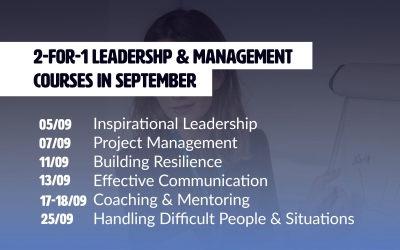Whether you’re an office manager or a project leader, all good leaders require several skills to positively interact with and manage others. With that in mind, below are the 10 workshops and accredited courses we recommend to upskill any Senior Manager or Leader.
Human Resources Toolkit for Managers
All leaders have HR-related responsibilities when managing others. It is important to become aware of what is expected of you, to ensure you remain compliant with the law and to treat your staff appropriately. Learn practical tools to help managers feel more confident in dealing with HR matters.
As a senior member, you may already work long hours and have come to terms with what “work-balance” means to you, however, this may be different from your team’s idea. Understand how to get the best out of your team without exceeding their limits.
Finance for Non-Finance Directors
No matter what level of seniority you are, having knowledge of the company’s finances is essential, to drive results in your department. Understanding finance allows you to interact productively with colleagues in the finance department, exerting a greater influence on decision making.
Emotional Intelligence
As an individual with authority and responsibilities, mastering your emotions is essential in challenging situations. Leaders should have the ability to recognise and understand the emotions of others to build stronger working relationships and know how and when to inspire, motivate, delegate and support teams.
Effective Communication
Having effective communication skills is vital for any individual - even more so for new managers who have been internally promoted and will have to learn how to adjust their communication style to fit their new role and responsibilities.
Performance Management
As a manager, it is your duty to manage and motivate people in order to achieve their best. Being an effective manager you should understand how to manage behaviour, productivity and expectations, and give constructive feedback, in order to get the best out of your people.
Hold yourself accountable for learning, growing and improving, and encourage and appreciate this behaviour among your team members.
Motivation & Delegation
Within any organisation, members of the team need to feel valued in order to perform efficiently. Both motivating and delegating through differing communication styles and techniques helps engage your team’s eagerness in order to successfully achieve targets and objectives.
Influencing & Persuading
Managers are regularly required to influence others in their roles. For example, asking a team member to stay late. Developing a range of communication skills will allow you to effectively influence and persuade your colleagues and help you produces the outcomes you need.
Inspirational Leadership
The ability to inspire people to reach great heights of performance and success is a skill that leaders need. To experience inspiration, people need to feel included and heard. Learn how to lead, organise and motivate a team in order to achieve outstanding performance and results.
Coaching & Mentoring
Mentoring individuals within your team will allow managers to pass on vital skills required to succeed within the organisation. Develop your team and help them unlock their potential. Learn how to build rapport, actively listen and effectively communicate with your mentee.
If you’re looking for a formal qualification to advance and refine your management skills, why not try the ILM Level 5 Award in Leadership & Management. The Level 5 qualification focuses on delivering technical knowledge, strategic insight and practical expertise.
Some people believe that leaders are born, not made. Others, however, think leadership skills can be developed and honed, just like any other ability.
Throughout September on the blog, we are taking a look at the different skills required for managers and leaders to successfully fulfil their duties, and how to get them.
We’re going to start at the beginning of the management journey, with skills for new managers.
Being promoted to manager for the first time is both exciting and challenging. It takes a lot of hard work and reliability to move up the corporate ladder but transitioning into your new role means mastering a new skill set. No matter what kind of business or field you work in, these 6 workshops will give you the skills to navigate the new, undiscovered managerial waters.
Improving your Personal Impact
The ability to understand how you are being perceived - and to manage your interactions based upon both this perception and the communication style of the other person - is vital to building effective relationships. Learn how to build your brand, become more assertive, and handle conflict effectively.
Effective Communication
Having effective communication skills is vital for any individual - even more so for new managers who are internally promoted and will have to learn how to adjust their communication style to fit their new role and responsibilities.
Handling Difficult People & Situations
Not all situations that come before the new manager will be easy to deal with. A main responsibility and obligation as a manager are to address and confront difficult and uncomfortable issues in a professional and confident manner. Improve your assertiveness, the ability to use effective questions and active listening skills.
Negotiating with Confidence
As a new manager, you may be tasked with negotiating with individuals internally and externally. Entering negotiations confidently to ensure that win-win results are obtained. Equip yourself with the ability to reduce the number of negotiations by justifying your position and reducing unnecessary discounting.
Time Management
For all people within the business, time management skills are crucial to delivering results. As a manager, you are now responsible to coordinate the work from a team of people. Learn how to plan and prioritise your workload, eliminate time stealers and manage your new work environment.
If you’re looking for a formal qualification to help you start your journey, why not try the ILM Level 3 Award in Leadership & Management. The Level 3 qualification provides a foundation of managerial skills for new managers, by developing the skills and knowledge to lead, organise and motivate teams. Throughout the programme, you will learn key leadership styles, how to confidently solve problems and make decisions more effectively.
For more information on how we can assist you on your management journey, call Dawn on 01332 836638
Love to learn? We’re back with another amazing offer to make learning more likely – receive 2-for-1 on Leadership & Management courses taking place throughout September.
Why not take this opportunity to try out some of our highly commended courses, whilst gaining the practical skills, knowledge and confidence to make the transition from your current role to business leader quickly and effectively. With our range of instant impact courses, apply your new skills in the workplace immediately through the practical nature of each course.
5th Inspirational Leadership
6th An Introduction to Project Management
11th Building Resilience for Success
13th Effective Communication
17th & 18th Coaching & Mentoring
25th Handling Difficult People & Situations
It’s easy to book online, simply add the courses to your basket and use 24U code at check out. Any issues? We're here to help - call us on 01332 836638 or contact us via email at This email address is being protected from spambots. You need JavaScript enabled to view it.
We also have the following compliance courses available throughout September, that are designed to develop your personal skills and where appropriate meet legislative requirements. To understand the importance of compliance training, click here.
13th Level 2 Award in Food Safety in Catering
14th Level 2 Award in Health & Safety in the Workplace
17th & 18th & 19th Level 3 Award in Full First Aid at Work
24th & 25th Level 3 Award in Refresher First Aid at Work
To see our full list of upcoming courses in 2018/19, click here
Follow us on Twitter to keep up to date with the latest - @RHThinking
Leadership and management isn’t easy. Learning a management theory is great, yet translating this into performance is what matters.
Studying an ILM (Institute of Leadership and Management) qualification certainly shouldn’t be overlooked. It will not only improve your performance as a manager, but it will also increase your employability and enhance your career prospects further.
ILM assessments focus on delivering practical skills and knowledge directly into the workplace. The qualification is founded on work-based learning, with assessments based on projects that relate to the employer, and ensure learning is relevant and applied.
ILM qualifications start at Level 2, (ideally for team leaders) and follow to Level 7 (suited to senior managers) and each level can be achieved at Award, Certificate or Diploma status depending on the number of credits gained.
So what are the benefits of studying an ILM qualification?
The ILM qualification gives you a range of key management skills and techniques to drive better results in the workplace. Building your leadership capabilities, allowing you to motivate and engage teams and manage relationships confidently.
ILM is an incredibly useful qualification as it enables you to undertake units which either you or your employer think are needed in order to suit your requirements and particular skills gap. ILM provides a broad range of optional units, therefore it is a qualification which can be tailored to your organisation’s learning and developmental needs. Set by a series of levels and regulatory frameworks, the qualifications increase with complexity and knowledge as you develop through the framework.
A qualification that grows and develops with you, it allows you to develop as a manager and diversify your skills according to.
At Roundhouse Thinking, we deliver ILM training at Levels 3 and 5. If you would like further information, please click here. Alternatively, give us a call on 01332 836638 or contact us via email at This email address is being protected from spambots. You need JavaScript enabled to view it.
Don’t forget to follow @Rhthinking for the latest news and updates!
The road to resilience: 4 ways to build resilience at work
By Oxford Dictionary’s definition, resilience is ‘the capacity to recover quickly from difficulties’. The benefits of being resilient are endless. Resilient staff cope better with the demands and stresses of a modern workplace, such as difficult people, tight deadlines and hefty workloads.
Although resilience is not something you are either born with or without, we can all develop resilience through learning new habits and developing strategies.
Here are four tips to help you become more resilient at work:
Make connections and build relationships.
Good relationships with family, friends and work colleagues are important. Resilient people will reach out and ask for help without feeling inadequate or intimidated. Accepting help and support from a strong network strengthens your resilience.
Use setbacks as learning experiences.
Highly resilient people are open to trying new things and will view the occasional failure as an essential stage in the process of achieving final success. It has been noted throughout history that successful men and women all face setbacks but it’s how they persistently overcome those setbacks which inevitably makes them successful.
In the words of Winston Churchill, “Success consists of going from failure to failure without loss of enthusiasm”.
You can’t change the fact that highly stressful situations happen, however, if a problem occurs during your day, use it as a learning experience to develop and practice new skills and be aware of how you respond to the problem. Being emotionally intelligent and aware of your emotions will help you to manage them more appropriately.
Practice realistic optimism.
An optimistic outlook enables you to expect that good things will happen in your life. Being a realistic optimist encourages self-control and control over interpersonal relationships. Try visualising what you want, and creating action plans on how you’re going to achieve it, rather than worrying about what you fear. Thinking positive and having confidence in your abilities helps build resilience.
Take care of yourself.
Pay attention to your own needs and feelings. Engage in activities that you enjoy and find relaxing. Exercise regularly. Taking care of yourself helps to keep your mind and body primed to deal with situations that require resilience.
For more top tips, make sure you follow Roundhouse Thinking on Twitter and LinkedIn.
6 Essential Qualities you need to become a Leadership Role Model
Leadership is established over time through teaching, learning and experience and is a set of skills acquired, which when combined; equip you with the ability to lead a team to success.
Consider these 6 behaviours to become an effective leader.
• Self-Awareness of your strengths and weaknesses allows you to understand other people and how they perceive you. This in turn increases trust and credibility within your team. It also allows you to implement change effectively within your organisation.
• Listening not only is essential part of communication between you and your team, it also develops trust, enhances motivation and helps detect and solve problems faster.
• Commitment to advance the welfare of employees. Dedicate time to developing your employee’s skills, through coaching, mentoring and training, to help them become better leaders.
• Empathy not only to identify with others but to accept what others contribute to the company.
• Persuasion will influence many stakeholders to follow a course of action. Having influencing skills will assist with organisational change and development.
• Foresight allows leaders to analyse the past to make informed decisions for the future.
Each person embodies at least some leadership qualities; it is how you use and adapt these that determines your success.
Are you looking to develop yourself or your team? We identify skills gaps and integrate training into your business in order to create instant impact and drive results. Learn more.
Don't forget to follow us on Twitter @RHThinking and LinkedIn for more top tips.
Have you ever considered your own leadership style? According to findings, there are four fundamental leadership styles, these being Pragmatist, Idealist, Steward and Diplomat. Leaders can be effective or ineffective with each of these four styles, and there are vast amounts of subtle variations which can determine what kind of a leader a person is.
We take a look at the defining features of all four categories – Can you identify your leadership style?
The Pragmatist
• High standards and expect themselves and their employees to meet those
• Driven and competitive
• Bold thinkers
• Least common of all leadership styles.
The Idealist
• High-energy achievers
• Believe in the positive potential of everyone
• Want to learn and grow
• Charismatic
• Open minded
• Prize creativity from themselves and others.
The Steward
• Dependable
• Loyal and helpful
• Values rules, process and cooperation
• Stabilising and calming.
The Diplomat
• Kind, social and giving
• Typically develop deep personal bonds with their employees
• Resolve conflicts peacefully
• Socially adept.
There isn’t a correct style of leadership and it certainly cannot be defined into a specific role. Often leaders today take defining features from each style in order to develop their own leadership style and capabilities. It’s incredibly important to understand your own style as you can then start to think about how to develop this further to achieve even greater results.
For more helpful tips, follow @RHThinking!
Sources
www.forbes.com/sites/markmurphy/2015/07/09which-of-the-4-leadership-styles-is-yours/#405020f411a2
From time to time, we all have to manage a difficult employee, colleague or client. Sometimes it’s a personality clash, other times it’s a more complex issue. Often, a problem is easy to solve as long as you don’t shy away from it and when issues arise, face them head on.
Prepare for emotion.
In the work place, often emotion isn’t considered, however emotion is only natural. Many people find it difficult to approach general emotions such as crying and anger so ensure you have a strategy in place for each. It may be also worth considering developing your emotional intelligence too. Expecting emotions is often better than dealing with them when they have taken you by surprise.
It’s not you, it’s the situation.
Difficult situations at work are rarely about you personally and instead, they are about the situation. Remember, people deal with situations very differently. What may cause angst and stress with one person, may not affect the other. Don’t take things personally, there is always a practical solution.
Listen – it’s important
It’s important to understand what the other person is saying. Exercise an active listening approach. By acknowledging their concerns, you are able to see their perspective. Take a conservative approach and try not to let opinions and false information get in the way. Remember, you are looking for a resolution and to banish negativity. Be calm and assertive at all times and if you are unsure, speak to someone trusted for advice.
Leave your door open.
We can all say things by mistake or in the heat of the moment, therefore ensure that if a colleague does change their mind they can do this with their dignity intact. Showing people up in front of others isn’t good practice and this will only lead to long-term negativity. Giving people the opportunity to calm down, apologise or explain is good, yet don’t let this be a regular occurrence. Remember to be vigilant as you may get taken for granted.
Think about others.
If you feel that your own manager is becoming increasingly difficult to deal with, try to understand what stresses they may have. Managing your own time effectively will show your manager that you are capable and they don’t have to watch over you, therefore reliving stress. You can also take an interest in what is going on within work and whether they require any additional help.
Break time.
When a situation becomes heated, it is important to take a break. A break allows you to regain control before things become too heated or emotional. Suggest getting a coffee, taking a walk and return to discussing the situation in a calmer manner.
Responsibility of a manager.
You need to ensure that you have handled things in a positive, calm and rational manner. Remember, a manager is judged not only on their own performance, but also on how they interact and get the best out others.
Follow @RHThinking for more helpful tips!









